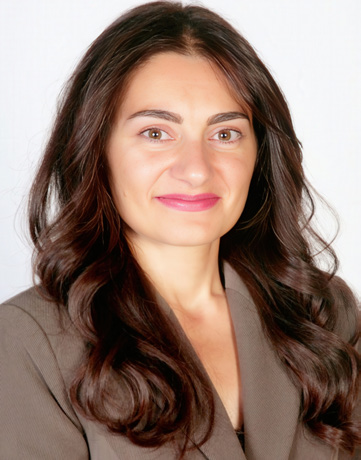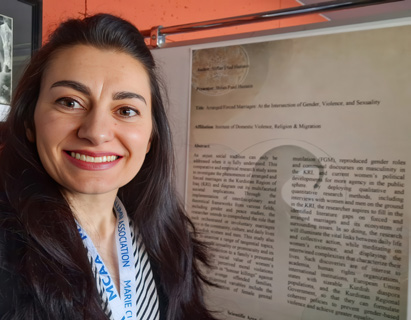News from the MCAA - Patriarchy, culture, and law: The persistence of gender-based violence - September 2025
Newsletter
As part of my Marie Curie Postdoctoral Fellowship, my research focused on the challenges faced by Kurdish women in the Kurdistan Region of Iraq (KRI), and more broadly the Middle East, particularly forced marriages, female genital mutilation (FGM), and honour killings, so called patriarchal trifecta. This article builds on those findings to explore how these practices persist not only in the KRI but also globally, shedding light on the ongoing struggle for gender equality.
Gender-based violence is a widespread issue, manifesting in harmful forms. In the KRI, these practices severely limit women's autonomy and perpetuate a cycle of violence. While particularly prevalent in the KRI, these practices are not confined to that region; they persist across South Asia, Sub-Saharan Africa, and parts of the Middle East. Recent legal changes in Iraq, lowering the legal marriage age for both girls and boys, further entrench child marriage and reduce protections for women and girls. These shifts reflect broader systemic issues, where women continue to experience violence within both family and societal structures.
Research conducted between 2022 and 2024 highlights regional differences in the prevalence of these practices. Urban centres report fewer cases of forced marriage and FGM, while rural areas, shaped by religious conservatism and limited education, remain hotspots for gender-based violence. These disparities underscore the need for policies tailored to local contexts. The fight for gender equality in the KRI is deeply connected to broader movements for national and human liberation, as captured in the Kurdish slogan “Jin, Jiyan, Azadî” (Woman, Life, Freedom). Understanding how tradition, religion, and social and political structures intersect is crucial for developing solutions to gender- based violence. Tackling these issues is key to achieving lasting progress for women – not just in the KRI, but globally.

Shilan Fuad Hussain
Bionote
Shilan Fuad Hussain is a researcher and analyst dedicated to advancing gender equality and advocating for women's rights. She serves as an Associate Editor for Brill and Routledge and as a Senior Consultant on gender-related societal issues. She is also an academic expert for the Institute of Domestic Violence, Religion & Migration (UK) and The Integrity Centre. Shilan works on various topics, including cultural representation, gender-based violence, women’s human rights and empowerment, state policies for gender equality, female genital mutilation, sexuality, arranged/forced marriages, the social impacts of masculinity, and multi-identity in the diaspora. Her current work sits at the intersection of sociology and cultural analysis and its symbiotic relevance to modern society.
Gender-based violence in Iraq: the patriarchal trifecta
In the KRI, gender-based violence is entrenched within a patriarchal trifecta: forced marriage, (FGM), and so-called honour killings. These interconnected practices constrain women’s autonomy, reinforce patriarchal dominance, and sustain generational cycles of harm. While particularly acute in the KRI, this trifecta reflects a broader global architecture of gendered oppression.
Each element – whether forced marriage, FGM, or honour killing – feeds into and fortifies the others. Women coerced into marriage are often denied education and financial independence, rendering them more susceptible to abuse. FGM frequently precedes early marriage, compounding disempowerment. Honour killings then emerge as the brutal culmination of these compounded vulnerabilities. This is not merely a sequence but a structure – one designed to maintain control over women’s bodies and choices.
A global affliction
Although especially prevalent in the KRI, these practices echo across the globe. In Pakistan, hundreds of women are slain each year in the name of honour. In Somalia, despite legal prohibitions, more than 90% of women aged 15 to 49 have undergone FGM. In Iraq and other Middle Eastern contexts, patriarchal legal systems and social taboos obstruct women from reporting abuse or escaping coercive marriages. Thus, the KRI’s challenges must be situated within a global continuum of gender inequality – a system in which women’s bodies become battlegrounds for cultural, religious, and political control.
Legal regressions and systemic setbacks
Recent legislative amendments in Iraq have further endangered women and girls. By permitting girls as young as nine to be married and reducing the legal marriage age for boys, these reforms dismantle hard-won protections against child marriage. They also erode women’s rights to divorce, child custody, and inheritance. Legal advocacy groups in the KRI have decried these measures as direct violations of international treaties, including the Convention on the Elimination of All Forms of Discrimination Against Women and the Convention on the Rights of the Child. These amendments also shift family law into the domain of religious authorities, bypassing Poster Presentation at the MCAA democratic mechanisms and public scrutiny – signalling not only a retreat in gender rights but also in democratic governance itself.

Poster Presentation at the MCAA Annual Conference in Kraków, 2025
Geographies of patriarchy: regional disparities
My field research conducted between 2022 and 2025 reveals marked disparities in the prevalence of forced marriage, FGM, and honour killings across the KRI. Urban centres such as Hewlêr (Erbil) and Silêmanî (Sulaymaniyah) report lower incidences compared to rural regions, where traditional religious views and educational limitations perpetuate violence. Religious conservatism exerts a strong influence in these areas, and families adhering to stricter interpretations are more likely to condone such practices. The intersecting variables of education and economic status are critical: women without access to either are most at risk.
Tradition as justification – and the struggle against it
Cultural narratives often cloak these harmful practices in the language of tradition. Some defenders claim that forced marriage and FGM are intrinsic to Kurdish heritage. Yet such assertions confuse patriarchy with Kurdish identity. The Kurdish people have long endured cultural erasure; to conflate oppression with authenticity is to weaponise culture against the very women who sustain it. This framing risks portraying women’s liberation as a betrayal rather than a continuation of Kurdish resistance. Practices like FGM are driven by anxieties over female autonomy. The fear is not simply of the body, but of a woman who owns it – of a life lived outside the bounds of male control.
Complicity, resistance, and the quiet revolution
While systemic, this violence is not unchallenged. Many women resist – quietly but powerfully. They teach their daughters, they refuse unwanted marriages, they whisper their truths to trusted aid workers. These acts, though small and often hidden, chip away at the monolith. Yet some women also enforce these norms, not out of conviction but survival. In a world where disobedience invites social exile or violence, complicity can be a form of endurance. Men, too, often express conditional opposition: they denounce honour killings in the abstract, yet falter when the imagined victim is a sister or daughter. Honour, in this calculus, is inseparable from male ego and familial pride.
Toward liberation: law, culture, and the horizon of freedom
Despite efforts by the Kurdistan Regional Government (KRG) to enact reforms, gender- based violence remains pervasive. Legislative changes, though necessary, are insufficient in isolation. True transformation demands cultural and structural upheaval. International NGOs and legal advocates have laid important groundwork, but enduring change must rise from within the KRI – from communities willing to confront and undo the forces that bind them.
Women must be empowered through education, economic autonomy, and legal protection. Their struggle is not a marginal one; it is central to any vision of national and human liberation. For without the right to live – Jiyan – and to be free – Azadî – women remain prisoners in their own homeland. Only by dismantling the architecture of patriarchy can a future be imagined in which every woman commands the full dignity of her life and body.
Shilan Fuad Hussain
LinkedIn
Orcid
Institute of Domestic Violence, Religion & Migration, UK and The Integrity Centre, UK
shilanfuadhussain@gmail.com